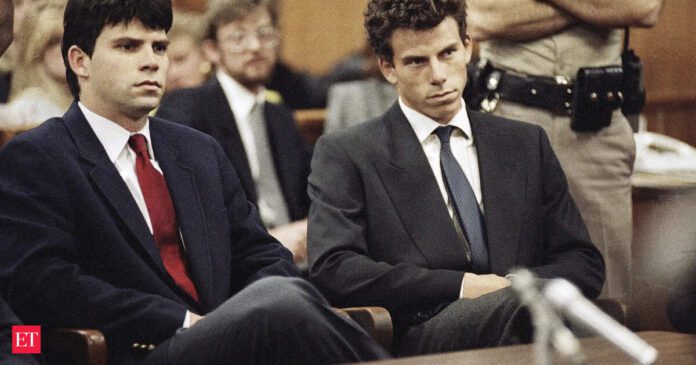Lyle Menendez, 57, and Erik Menendez, 54, who were convicted of the notorious 1989 shotgun killings of their parents José and Kitty Menendez, faced two separate hearings on August 21 and 22. Despite presenting decades of rehabilitative efforts and garnering public support, the brothers were each denied parole for a minimum of three more years.
Menendez brothers: Separate Hearings, Same Result
The hearings, stretching over hours, probed their original crimes, long record of disciplinary breaches, and personal growth behind bars.
Erik Menendez was grilled for nearly ten hours. Commissioner Robert Barton told him directly: “Contrary to your supporters’ beliefs, you have not been a model prisoner”, as quoted in a report by USA Today. He pointed to contraband smuggling, violent altercations, misuse of prison computers, and even a tax scheme tied to gang activity as reasons for denial.
Lyle Menendez, who has often been described as the more settled of the two, fared little better. His parole commissioner, Julie Garland, acknowledged his educational achievements and mentoring roles but emphasized persistent “anti-social traits” and a tendency toward “rule-breaking” that, in the board’s view, undermined his case for freedom, as per a report by USA Today.
The Role of Rule-Breaking
Both brothers admitted to past missteps, particularly the use of contraband cellphones to communicate with family and outsiders. Erik described his past behavior as that of “a man with no hope of release” trying to survive in a violent environment. He admitted involvement in a tax scheme run by a prison gang, calling it a decision born out of fear.
Lyle, in his hearing, conceded that he was “not a model incarcerated person” but maintained that he had worked to help others. Despite expressing remorse, commissioners remained unconvinced, stressing that inmates who repeatedly violate prison rules are likely to carry that behavior into society if released, as per a report by USA Today.
From Life Without Parole to Eligibility
The Menendez brothers’ path to parole consideration was itself unusual. Originally sentenced to life without the possibility of parole, a May resentencing reopened the door to parole hearings, a move that buoyed their supporters.Campaigns for their release gained traction in recent years, particularly on social media platforms, with younger generations revisiting their case through documentaries and dramatizations. Advocates highlighted allegations of childhood abuse, their decades of good conduct in some areas, and their role in educational and community programs inside prison.Yet the hearings this week underscored the parole board’s focus on strict adherence to rules and public safety.
Could They Still Walk Free?
Despite the setback, the Menendez brothers still have legal and political options available.
- Habeas Petition – Their attorneys have filed a habeas corpus petition citing newly revealed evidence they argue might have altered the original trial’s outcome. This petition remains pending in California courts, though it faces opposition from Los Angeles District Attorney Nathan Hochman.
- Clemency – Another potential avenue is clemency from California Governor Gavin Newsom. However, legal analysts say this is improbable following the parole denials. “I can’t see him sticking his neck out and pardoning the Menendez brothers or commuting their sentences over the parole board’s denial,” said Neama Rahmani, a former federal prosecutor.
Menendez Family Reaction
The Menendez family, many of whom have publicly forgiven the brothers, reacted with disappointment but not despair. In a statement released after the hearings, spokesperson Laziza Lambert said: “While we are of course disappointed by today’s decision, we are not discouraged. This is not the end of the road. We know they are good men who have done the work to rehabilitate and are remorseful. We love them unconditionally and will continue to stand by them.”
Family members also expressed frustration at the intense media coverage, saying the focus often overshadowed the brothers’ rehabilitative efforts.
Menendez Brothers’ Time in Prison
Over three decades behind bars have seen starkly different phases for the brothers. Both pursued educational opportunities, with Lyle completing a master’s degree and mentoring fellow inmates. Erik took part in various rehabilitative programs and has often spoken about personal growth since his early years in prison.
However, both also accumulated extensive records of infractions, particularly in the first two decades of their incarceration. Commissioners noted that even in recent years, prohibited cell phone use continued to raise concerns about their ability to follow rules consistently.
Menendez Brothers: What Lies Ahead
With parole denied until at least 2028, the brothers will remain in California prisons, where they have been incarcerated since the early 1990s. Legal observers say their best chance of release lies in the habeas petition, though such appeals often move slowly and rarely succeed in high-profile murder cases.
Clemency remains legally possible but politically sensitive. Governors rarely intervene in cases where parole boards have recently determined inmates remain a risk to society.
For now, the Menendez brothers’ quest for freedom has been delayed, if not derailed.
FAQs
Why were the Menendez brothers denied parole?
The Menendez brothers were denied parole due to a history of prison infractions, including contraband use, involvement in a tax scheme, misuse of prison computers, and possession of unauthorized cell phones. Commissioners said these rule violations suggested they would remain a risk to society if released.
What options do the Menendez brothers have after parole denial?
They can reapply for parole in three years. In the meantime, their attorneys are pursuing a habeas petition citing new evidence. They could also theoretically receive clemency from California Governor Gavin Newsom, though experts believe this is unlikely given the parole board’s ruling.

